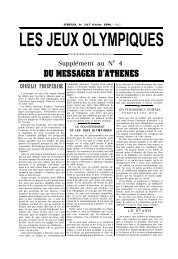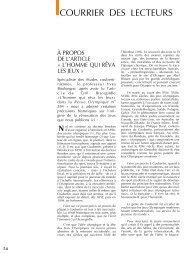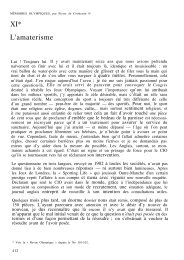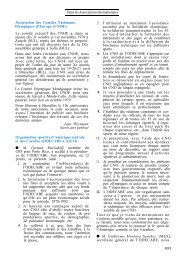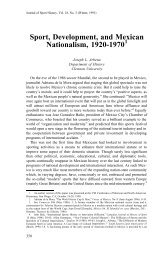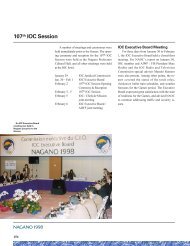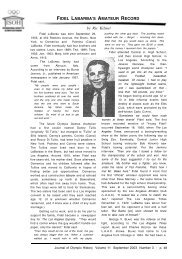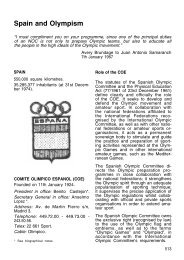Sport and Colonialism in 19th Century Australasia - LA84 Foundation
Sport and Colonialism in 19th Century Australasia - LA84 Foundation
Sport and Colonialism in 19th Century Australasia - LA84 Foundation
You also want an ePaper? Increase the reach of your titles
YUMPU automatically turns print PDFs into web optimized ePapers that Google loves.
other's needs, wherever there was a gr<strong>and</strong>st<strong>and</strong> the mix<strong>in</strong>g of<br />
the classes could be m<strong>in</strong>imised; though real segregation could<br />
not be achieved until the second half of the n<strong>in</strong>eteenth century,<br />
when the enclosed racecourses were carefully divided <strong>in</strong>to sections<br />
for the various strata of society - each section charg<strong>in</strong>g<br />
a different admission price <strong>and</strong> provid<strong>in</strong>g different forms of<br />
additional enterta<strong>in</strong>ment. 21<br />
In late eighteenth century Brita<strong>in</strong>, however, the gentry <strong>and</strong><br />
the labour<strong>in</strong>g classes found their traditional gambl<strong>in</strong>g <strong>and</strong><br />
general leisure pursuits under attack from a highly vocal<br />
middle-class group which adhered to <strong>and</strong> expressed the new values<br />
of the <strong>in</strong>dustrialis<strong>in</strong>g society. As the nation rapidly became<br />
more <strong>in</strong>dustrialised, the strength of the new values grew <strong>and</strong><br />
their adherents' power to reform the society also grew. The<br />
three ma<strong>in</strong> elements <strong>in</strong> the subsequent attempts to reform traditional<br />
recreations were the concept of an <strong>in</strong>dustrial labour discipl<strong>in</strong>e,<br />
a re<strong>in</strong>forcement of Brita<strong>in</strong>'s puritan tradition <strong>and</strong> the<br />
physical consequence of rapid urbanisation.<br />
The new concept of <strong>in</strong>dustrial labour discipl<strong>in</strong>e drew a firm<br />
dist<strong>in</strong>ction between work <strong>and</strong> leisure. It was concerned with<br />
efficiency <strong>and</strong> productivity <strong>in</strong> work time <strong>and</strong> saw recreation or<br />
leisure as unproductive idleness <strong>and</strong> consequently as a dra<strong>in</strong><br />
on the national economy. As such, leisure could be seen as unpatriotic<br />
<strong>in</strong> a society which was beg<strong>in</strong>n<strong>in</strong>g to view <strong>in</strong>dustrial<br />
progress as the supreme symbol of civilisation <strong>and</strong> the proof of<br />
British superiority. 22<br />
This attitude to leisure was re<strong>in</strong>forced by the remnants of<br />
Brita<strong>in</strong>'s long st<strong>and</strong><strong>in</strong>g puritan tradition, which had had its<br />
foremost expression dur<strong>in</strong>g Oliver Cromwell's post civil-war<br />
protectorate <strong>in</strong> the seventeenth century. This tradition was<br />
given a new lease of life by an eighteenth century evangelical<br />
religious revival. Evangelicalism, with its emphasis on selfdiscipl<strong>in</strong>e,<br />
s<strong>in</strong> <strong>and</strong> salvation, <strong>and</strong> st<strong>and</strong>ards of morality, was<br />
well suited to the aims of the grow<strong>in</strong>g urban-<strong>in</strong>dustrial middle<br />
class. It nicely complemented the <strong>in</strong>dustrial labour discipl<strong>in</strong>e. 23<br />
The third major element promot<strong>in</strong>g reform of traditional<br />
recreation practices was the process of <strong>in</strong>dustrialisation. The<br />
rapid <strong>and</strong> haphazard growth of the <strong>in</strong>dustrial towns <strong>and</strong> cities<br />
11



